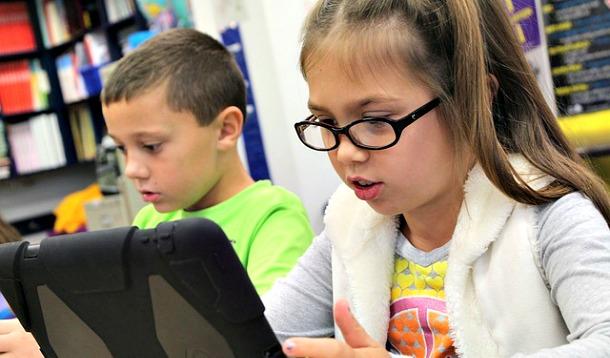
After 15 months of being off with my daughters, I returned to the classroom in September, to a new school, and - seemingly - to a new era in teaching. This school is outfitted with lots of technology, and armed with a bit of training, I was eager to try teaching in a new style.
The bulk of my teaching day is devoted to students who are a grade or two behind in math and language, usually due to a learning disability. My class size is small, and my job revolves around closing the gaps in their learning and teaching new strategies to help my students access the curriculum. I have done this job many times over my career - and enjoyed it immensely - but never have I felt more effective at it than this year.
Sure, some of that is attributed to my growth as a teacher and the expertise that simply comes with experience, but much of it has to do with the tools technology affords me. I am able to easily offer my students current news stories catered to their reading level. I can provide a truly personalized math program, teaching each pupil at their pace and level. I am learning how to put my Interactive WhiteBoard to its best use and exploring the benefits of Google Classroom - and thanks to the endless supply of YouTube videos and teacher share sites, I can climb the steep tech learning curve at a much faster rate.
I absolutely believe the teachers and the education system must grow and evolve to reflect the needs of the communities they serve. Technology is changing our world at a dizzying pace and the school system is running to catch up with it.
With so much information always at students’ fingertips, with the answer to most questions being just a Siri away, with Virtual Schools and online courses on the rise, will teachers one day become completely obsolete?
Can children organize themselves to learn given the right environment? Is school, as we know it, on the way out?
Of course, as a teacher, my immediate, self-preservation, survival-of-my-species reaction is “NO WAY! Teachers are vital to learning.” But I have to admit, there is great power in letting kids discover learning themselves and in letting them chose the direction of their research. Sugata Mitra does an excellent job explaining this concept in his TED talk. Basically, his project began when he gave non-English speaking children, who had never seen a computer before, access to the Internet and then he left them alone. In a few short months the children had learned the English required to run the machine, as well as how to use the machine to learn from.
Here’s the thing. For me, school is about so much more than acquiring facts. School is where you learn to cooperate with others, where you learn to work as a team, where you learn to take direction and how to speak your mind. School is where you learn to solve conflict, to discipline yourself to focus on a task, to set goals and work toward them. Sure, these skills can be learned elsewhere - I’m sure there must be studies that show children who are homeschooled may not be deficit in these skills - but for most kids, school is where we figure this stuff out.
And school is more than class time. It is cafeterias and soccer teams. It is field trips and drama clubs. It is spirit days and choirs.
Teachers are not Google. I cannot answer every one of my student’s questions. I cannot provide pages of literature within seconds. But, I can coach my students in how to find information. I can encourage them to persevere when a problem is tough. I can recognize a student who is struggling and work to find a different way of reaching that student. I can see a student who doesn’t have a friend and work to make that happen for them. I can listen to a student who is in a terrible home situation and get them the help they need. I can foster creativity and pose interesting problems to be solved. I can inspire a student to push themselves harder and to do more.
So far, a computer can’t replicate that. If every child sat at home, attending a virtual school and seeing a computerized version of a teacher on their screens, I think humanity would lose a vital social environment that is necessary for our future.
I am loving the way technology is making my classroom better. I am loving the way it helps me personalize programming for students who need it. I’m am loving the way it is helping me be a more effective teacher. Although I don’t think it’s quite ready to oust me from my job yet, I recognize the times, they are a-changin’ and education best be changing along with them.